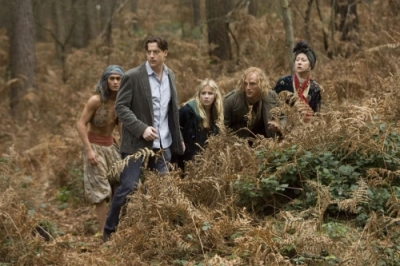Character actors in the wild live in fear of the carnivorous Editing-Room Floor.
The opening scene of Inkheart is a telling one; bookbinder Mo (Brendan Fraser) sits down with his wife Resa (Sienna Guillory) and his infant daughter Meggie, and as he reads aloud from Little Red Riding Hood, a red cape flies through the night and settles on their laundry line…
…as a voiceover explains that some people have the power to make things appear by reading aloud from books.
It smacks of studio concerns that audiences won’t understand the conceit, even when the movie centers on it—the very fact that this is a movie adaptation of a Cornelia Funke bestseller should be an example of the power of the written word to come to life. Unfortunately, the movie never seems to trust its audience, throwing chase and rescue scenes wherever possible, while either drawing out unexplained conflict or launching sudden volleys of exposition.
On the other hand, the movie’s first thirty minutes involve a cryptic faceoff, a low-speed chase in a van, and a scraggly British man and weasel chasing after them (just another day in Switzerland!), so maybe I should take my exposition where I can get it.
The plot continues apace, wearing out both the narrative and the audience’s patience—we often meet a character just before the next chase scene descends. For a movie about the power of words, Inkheart at times feels like a Benny Hill sketch, with small groups of people running feverishly back and forth between various charming locales.
As if to make up for the lack of balance in the plot, the script takes pains to remind us (between chases, captures, and rescues) that the read/written/spoken word is what’s really Important. “The written word is a powerful thing,” Mo monotones to his daughter. Later, after a subtle scene where Eleanor and Meggie bond over an ancient Persian manuscript, Mirren gets handed a half-page monologue about how books take you to other lands without ever leaving a room. In most circumstances, this would be unbearable; Helen Mirren, naturally, pulls it off.
And therein lies Inkheart‘s redemption. Even in the midst of choppy plotting, the cast shines. As scraggly British weasel-owners go, you can’t beat Paul Bettany. His fire-thrower Dustfinger is the movie’s lynchpin, and even though his capricious decision-making seems (in the film, at least) to be little more than excuses for chase scenes and manufactured dramatic tension, Bettany makes the most of every sidelong glance and manages to build a character of compelling cowardice. Rafi Gavron as Arabian Nights thief Farid is given little to do except marvel at button-down shirts and scale walls, but is as charming as the slight role requires. Mirren is as archly acidic as the script allows, Jim Broadbent offers his trademark wry pathos, and newcomer Eliza Bennett (as Meggie) delivers an understated and naturalistic performance that carries the movie long after it gets swept up into the Great Plot Hole in the Sky.
Sadly, Fraser’s performance is as spotty as Mo’s antique books. He seems to have cracked under the pressure of being Funke’s inspiration. His performance is studded with bizarre close-ups of twisted brows, wide eyes, and randomly portentous line readings. When the movie improves as your hero fades into the background, it’s not a good sign.
Good news: that background is lovely. The production design is enchanting and immersive, from the quaint Italian village to the smoky monster-stables to Aunt Eleanor’s sprawling lakeside palace. The costumes are detailed yet unobtrusive (excepting the kitchen maid who sports red brocade), and the special effects are never overdone. The movie wisely errs in favor of half-seen actors in suits and white-horse-with-plastic-horn unicorns, and saving the fancy CGI for the movie’s biggest villain.
The overall feel of the movie is of something handmade and heartfelt. Even when the plot makes no sense, it’s easy to see this movie was a labor of love. The plot (and Fraser) might well just have been treated roughly in the editing room. Having not read the book, I can’t speak to its success as an adaptation, but the film certainly made me want to pick up a copy of the novel. Another success for the Power of the Written Word!
Verdict: Inkheart is worth a look, if you don’t mind your movies slightly foxed.










